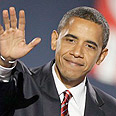
Aspiration for peace. Obama
צילום: AP
No longer loyal
Traditional notion of loyalty to Israel changing under Obama administration
Part 1 of analysis
When Silvio Berlusconi was once asked whether he is loyal to his wife, he replied, partly seriously and partly tongue-in-cheek: “Frequently.” We can assume that had senior Obama administration officials been asked about America’s loyalty to Israel at this time, they would not have qualified their answer, and certainly would not have resorted to terms such as “frequently.”
Nonetheless, it appears that under the new administration this loyalty takes on a different shape that what we have become accustomed to. The changing and decisive tone towards Israel, including the rather overt stipulations presented to it, compared to the largely conciliatory tone adopted towards some of its enemies, and especially Iran, Hamas, and Syria show us that the loyalty to us is not as it used to be.
Yet perhaps more than this is a question of loyalty, particularly to Israel, it is about the worldview of the person who is currently at the top of the American pyramid. This perception was shaped in liberal habitats such as Columbia and Harvard University and the leftist camp within the Democratic Party, and it ideologically sanctifies almost any appeasement of crazed thugs, even of Ahmadinejad’s and Kim Jong-il’s type.
This stance prefers almost unconditionally appeasement and aspiration for peace over the use of force, even towards those who only understand the language of force. This perception is endorsed by many within academia, cultural circles, and the media, which urge those who adopt these views to show consistency with their restraint and appeasement of their enemies even when reality no longer welcomes their dreams.
When Neville Chamberlain returned to London on September 30th, 1938 after signing the Munich Agreement and waved the piece of paper with Hitler’s signature on it while informing the world about “peace for our time,” Britain was overjoyed, just like quite a few people in the Western world. This was indeed collective joy over troubles that in their view were averted, yet it was fanned by many supporters who endorsed Chamberlain’s diplomatic wisdom and vision.
Rebranding America
Later on, Churchill delivered what amounted to a eulogy for his predecessor, and due to the required sensitivity only “praised” him a little: “It fell to Neville Chamberlain…to be contradicted by events…and to be deceived and cheated by a wicked man.”
Obama is indeed no Chamberlain yet, and the current circumstances are not exactly the same as they were in Europe in the late 1930s, yet it appears that quite a few wicked men, from Tehran to Caracas and from Pyongyang to Damascus, keep on rubbing their hands with glee over the new policeman’s arrival in the neighborhood. A policeman who refrains from slapping offenders with fines, who strongly believes in the need to appease rioters, who is convinced of the logic of reconciliation with criminals, and who is certain that if only he asks them to do so, they would of course refrain from carrying out their malicious plans. Is it any wonder then that Ahmadinejad suddenly feels like a courted young woman?
Regardless of whether this is about a request submitted to Congress to change the law so that it allows for aid to be handed over to the Palestinian Authority even if Hamas joins a unity government; the examination of the possibility of reaching out to moderate elements among the Taliban; a willingness to remove Syria from the list of terror-sponsors; the complete helplessness in the face of North Korea’s provocations; bowing down to the Saudi king; or the declarations that Islam contributed to shaping America – all of the above are part of the process of reshaping and rebranding America.
Part 2 of analysis to be published Wednesday night
Dr. Shaul Rosenfeld is a philosophy lecturer










